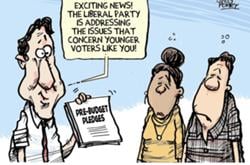When British Columbia cabinet ministers, backed by dozens of young people, gathered on the steps of the legislature to announce the "re-engineering" of education and training in the province, the NDP's advanced education critic David Eby was listening on the lawn with a photocopied page from a 2007 report in his hand.
"The idea that higher education policy should be a response to what the marketplace needs is an approach that views learners narrowly as economic objects and inputs, rather than as citizens," said that report, Campus 2020, written by former BC Liberal attorney general Geoff Plant after he left government.
Better "to create the best and widest possible opportunities for learning" to give the province the greatest chance of social and economic success, he wrote.
It appears that just a few years ago universities were fashionable, but now the fashion has changed, said Eby.
Indeed, the direction the government announced yesterday, aimed at encouraging people to learn skills that could be used in a proposed liquefied natural gas industry or other big industrial projects, was pretty much what Plant warned against seven years ago.
Here's how Shirley Bond, the jobs, tourism and skills training minister, described the new direction: "The most important shift is we are actually going to look at current and accurate labour market data as we move forward ... It's about training the right number for the right jobs today and in the future."
Pragmatic approach: Bond
The shift involves reallocating some of the $7.5 billion a year the province spends on education and training. In total $3 billion will be reallocated over ten years. Some 25 per cent of the operating grant money that goes to post-secondary institutions will now need to be spent on training people for in-demand jobs, up from the current 10 per cent.
That had reporters asking questions about what areas colleges and universities might have to cut to meet the government's new direction. "This is not about the elimination of programs, deciding which program is going to stay or go," Bond responded. "It's about over time using data to determine programs that are going to be offered in British Columbia. I think British Columbians are going to think that's a pretty pragmatic approach."
For the announcement a mobile unit for training welders was parked in front of the legislature and much of the report and discussion dwelt on the need to train people for jobs related to liquefied natural gas.
A look at the government's WorkBC website suggests there are other areas with higher needs, however. The highest growing occupation groups are all in the health field, with in demand jobs including physicians, dentists, veterinarians, registered nurses, medical technologists, optometrists, chiropractors and therapists.
For at least some of those professions, the number of people trained is limited by the number of training positions the government is willing to fund. When I asked Virk if the announcement meant the government would fund more positions to train doctors, he said, "This is not all about hard hats and steel-toed boots."
There will be a need for all kinds of professions in the future, including physicians, social workers, engineers and managers, he said. The government will keep doing analysis on what's needed and the institutions will have to adjust what they do, he said. "They're going to have to examine where the needs are as we move forward and they'll do their prioritization based upon those needs."
As for where they might reallocate money from, he said, "I'm not going to make that suggestion."
No money to reallocate: Eby
The University of B.C.'s president Stephen Toope was unavailable for an interview, but released a prepared statement on behalf of the Research Universities' Council, which he chairs. "We look forward to continuing our work with government and employers to help young people put their university degrees to work," he said.
The release noted that university graduates do well in the economy, having higher employment rates and higher salaries than non-graduates. It also said that universities are always changing their programs to respond to the demands from students and parents.
The government's announcement made little sense considering the recent record on cuts to things like welding and English as a second language programs, as well as the underfunding of education in general, said Eby.
"I can't even understand what they're talking about," he said. "The schools don't have money for the basic programming right now, so taking money away from the schools to fund additional [needs] ... the math doesn't add up."
Schools are already cutting core programming, Eby said. "There's no money to reallocate."
Signal to LNG investors
One interpretation of the announcement is that it was needed to demonstrate to LNG proponents that the province is serious about having skilled workers ready. Quotes in a government backgrounder included one from Greg Kist, the president of Pacific NorthWest LNG, saying the company would need workers to construct and operate its facility.
"Time is of the essence, and we're encouraged by the positive and meaningful steps being made by the province of B.C. to expedite and enhance access to skills training for British Columbians who want to take part in the generational careers that projects like ours present."
Philip Hochstein, the president of the Independent Contractors and Businesses Association of B.C., said he appreciated the government encouraging people to train in skilled trades. "There are lots of opportunities so the sell shouldn't be very hard to get people to come," he said. "Frankly, young people are young, they're not stupid. They're going to see there's lots of opportunity, extremely well paid."
The government's job is to say 'yes' to the big projects that are being proposed, he said. When the jobs are created, people will want to fill them, he said. "I think they're going to realize that the opportunity to build their life and accumulate some wealth quickly at a young age is through the construction industry and the government's going to educate them for that."
NDP leader Adrian Dix said that he and his party have been pushing for increased skills training for a long time and campaigned on it in last year's election.
"The difference between a serious plan and this plan is the issue of resources," he said. The government clearly wanted to have a big announcement for Premier Christy Clark to make, he said. "What we don't have a substantive new resources put behind the premier's plan." ![]()
Read more: Education

















Tyee Commenting Guidelines
Comments that violate guidelines risk being deleted, and violations may result in a temporary or permanent user ban. Maintain the spirit of good conversation to stay in the discussion.
*Please note The Tyee is not a forum for spreading misinformation about COVID-19, denying its existence or minimizing its risk to public health.
Do:
Do not: